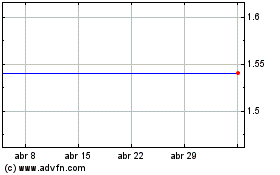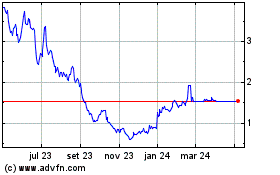NGM Biopharmaceuticals, Inc. (NGM Bio) (Nasdaq: NGM), a
biotechnology company focused on discovering and developing
transformative therapeutics for patients, provided additional
detail today on two late-breaking poster presentations it will give
on Wednesday, April 13, 2022, at the American Association for
Cancer Research (AACR) Annual Meeting. NGM Bio will also give an
oral presentation on April 10, 2022 at the AACR meeting featuring
preclinical data for the lead program in its myeloid checkpoint
inhibitor portfolio, NGM707, a dual ITL2/ILT4 antagonist antibody.
The late-breaking presentations will feature preclinical data
supporting the development of NGM831, an ILT3 antagonist antibody
product candidate, and NGM438, a LAIR1 antagonist product
candidate. ILT3 (also known as LILRB4) and LAIR1 are members of the
LILR family of receptors, which may play a central role in
establishing an immune-suppressive state in the tumor
microenvironment. NGM831 and NGM438 are engineered to target these
receptors, respectively, with the goal of releasing myeloid
checkpoints and reprogramming myeloid cells to enhance anti-tumor
immunity.
“We’re delighted to feature all three programs in our myeloid
reprogramming portfolio at AACR 2022, enabling our team to share
the extensive research that supports the development of these three
therapeutic candidates,” said Dan Kaplan, Ph.D., Head of
Translational Immuno-Oncology at NGM Bio. “NGM831, NGM438 and
NGM707 target distinct LILR receptors, each suspected of playing a
key role in driving immune suppression in the tumor
microenvironment. With all three programs anticipated to be in the
clinic by the end of this quarter, we look forward to seeing how
our preclinical findings may translate into potential benefit for
patients in their fight against cancer.”
A Phase 1/2 clinical trial of NGM707 is currently underway and
will evaluate NGM707 as a monotherapy and in combination with
KEYTRUDA® (pembrolizumab) in patients with advanced solid tumors.
An initial data readout from the Phase 1a monotherapy dose
escalation portion of this trial is expected in the second half of
2022.
NGM Bio recently announced the initiation of a Phase 1/1b
clinical trial evaluating NGM831 as a monotherapy and in
combination with KEYTRUDA in patients with advanced solid tumors.
NGM438 is anticipated to enter the clinic later this quarter.
About the NGM831 Late-Breaking Poster
Presentation: “Preclinical characterization of NGM831, an
ILT3 antagonist antibody for the treatment of solid tumors”Abstract
#: 7874Poster Session 18, Late-Breaking Research: Immunology 2,
April 13, 2022; 9:00 AM – 12:30 PM
NGM831 is an antagonist antibody product candidate being
developed by NGM Bio for the treatment of advanced solid tumors
designed to block the interaction of ILT3 with fibronectin, a key
component of the tumor stroma, as well as other cognate ligands. In
August 2021, NGM published a paper in Cancer Immunology Research, a
journal of the American Association for Cancer Research, describing
the company’s discovery that fibronectin, an extracellular matrix
protein that forms a fibrillar network within the tumor stroma, is
a functional ligand for ILT3. The fibronectin-ILT3 interaction
serves as a stromal checkpoint through which the extracellular
matrix actively promotes myeloid cell suppression in the tumor
microenvironment.
Per the AACR abstract, in preclinical studies NGM831
demonstrated the ability to bind human and primate ILT3 with high
affinity and specificity, and to block the interaction of ILT3 with
both of its reported ligands: fibronectin and ApoE. In a gene
expression profiling experiment, treatment of tolerogenic dendritic
cells with NGM831 in the presence of fibronectin decreased their
expression of inhibitory and ‘scavenger’ receptors, as well as
classical markers of an immune-suppressive myeloid cell phenotype,
and increased the expression of genes involved in antigen
presentation. These results suggest that the immune cells were
remodeled to a more stimulatory phenotype. Consistent with these
observations, treating tolerogenic cells with NGM831 increased
their production of pro-inflammatory cytokines and increased the
production of chemokines capable of recruiting immune cells to
sites of inflammation. In addition, NGM831 acted synergistically
with KEYTRUDA to increase the ability of dendritic cells to
stimulate T cell activation. Taken together, these results
demonstrate that NGM831 blocked fibronectin-mediated
immunosuppression and promoted myeloid cell reprogramming.
About the NGM438 Late-Breaking Poster
Presentation:“Preclinical development of NGM438, a novel
anti-LAIR1 antagonist monoclonal antibody for the treatment of
collagen-rich solid tumors”Abstract #219Poster Session 18,
Late-Breaking Research: Immunology 2, April 13, 2022; 9:00 AM –
12:30 PM
NGM438 is an antagonist antibody product candidate being
developed by NGM Bio to inhibit LAIR1 for the treatment of advanced
solid tumors. LAIR1 is a collagen-binding inhibitory receptor
expressed on immune cells that is implicated in immune suppression.
LAIR1 and collagens are upregulated in multiple cancer types where
collagens are produced by activated stromal cells and are
associated with poor responses to checkpoint inhibitors. For such
tumors, formation of collagen:LAIR1 complexes may act as a stromal
checkpoint to suppress productive immune responses in the tumor
microenvironment.
Per the AACR abstract, NGM Bio’s preclinical research
demonstrated that LAIR1 was expressed on circulating and
intratumoral immune cells of cancer patients, and LAIR1-expressing
cells were commonly found in collagen-rich tumor stroma. NGM438
reversed collagen-induced immune suppression in myeloid cells and
promoted T cell responses to anti-PD1 mAbs in immune cell-based
functional assays. Additionally, LAIR1 antagonism, in combination
with anti-PD1 mAbs, led to significant tumor growth inhibition in a
preclinical model resistant to either treatment alone. Taken
together, these results suggest that NGM438 may inhibit
LAIR1-mediated collagen-driven immune suppression alone and in
combination with checkpoint inhibition.
KEYTRUDA® is a registered trademark of Merck Sharp &
Dohme Corp., a subsidiary of Merck & Co., Inc., Kenilworth, NJ,
USA.
Abbreviations (in Alphabetical Order) Anti-PD1
mAbs=Anti-Programmed Cell Death Protein 1 Monoclonal Antibody;
ApoE=Apolipoprotein E; ILT2=Immunoglobulin-Like Transcript 2;
ILT3=Immunoglobulin-Like Transcript 3; ILT4=Immunoglobulin-Like
Transcript 4; LAIR1=Leukocyte-Associated Immunoglobulin-Like
Receptor 1; LILR= Leukocyte Immunoglobulin-Like Receptor [ILT2 =
LILRB1, ILT3=LILRB4, ILT4=LILRB2].
About NGM BioNGM Bio is focused on discovering
and developing novel, life-changing medicines for people whose
health and lives have been disrupted by disease. The company’s
biology-centric drug discovery approach aims
to seamlessly integrate interrogation of complex
disease-associated biology and protein engineering expertise to
unlock proprietary insights that are leveraged to generate
promising product candidates and enable their rapid advancement
into proof-of-concept studies. As explorers on the frontier of
life-changing science, NGM Bio aspires to operate one of the most
productive research and development engines in the
biopharmaceutical industry. All therapeutic candidates in the NGM
Bio pipeline have been generated by its in-house discovery engine,
with a disease-agnostic mindset, always led by biology and
motivated by unmet patient need. Today, the company has seven
disclosed programs, including four in Phase 2 or 2b
studies, across three therapeutic areas:
cancer, retinal diseases and liver and
metabolic diseases. Visit us at www.ngmbio.com for more
information.
Forward-Looking Statements Statements contained
in this press release regarding matters that are not historical
facts are “forward-looking statements” within the meaning of the
Private Securities Litigation Reform Act of 1995. Words such as
“will,” “may,” “expected,” “anticipated,” “implicated,” “designed,”
“engineered to,” “suspected,” “suggest,” “look forward,”
“potential,” “promising,” “goal,” “aspires,” “aims” and similar
expressions (as well as other words or expressions referencing
future events, conditions or circumstances) are intended to
identify forward-looking statements. These statements include those
related to: NGM Bio’s product candidates, including the potential
of NGM Bio’s oncology product candidates, NGM07, NGM831 and NGM438,
to release myeloid checkpoints and reprogram myeloid cells to drive
immune response in tumors and what these product candidates are
designed and engineered to achieve, including enhancing anti-tumor
immunity; the role of ILT3 and LAIR1 in establishing an
immune-suppressive state in the tumor microenvironment; potential
outcomes suggested by preclinical findings regarding NGM831 and
NGM438; the ability to enroll patients in and the availability and
anticipated timing of data from the Phase 1a study of NGM707; the
planned commencement of a first-in-human clinical trial of NGM438
and the anticipated timing thereof; NGM Bio’s aspiration to operate
one of the most productive research and development engines in the
biopharmaceutical industry and other statements that are not
historical fact. Because such statements deal with future events
and are based on NGM Bio’s current expectations, they are subject
to various risks and uncertainties, and actual results, performance
or achievements of NGM Bio could differ materially from those
described in or implied by the statements in this press release.
These forward-looking statements are subject to risks and
uncertainties, including, without limitation, risks and
uncertainties associated with the costly and time-consuming
pharmaceutical product development process and the uncertainty of
clinical success, including risks related to failure or delays in
successfully initiating, enrolling, reporting data from or
completing clinical studies, as well as the risks that results
obtained in preclinical or clinical trials to date may not be
indicative of results obtained in ongoing or future trials and that
NGM Bio’s product candidates may otherwise not be tolerable and
effective treatments in their planned indications; NGM Bio’s
ability to maintain its amended collaboration with Merck, including
the risk that if Merck were to breach or terminate the amended
collaboration or Merck’s development funding obligations, NGM Bio
would not obtain all of the anticipated financial and other
benefits of the amended collaboration, and the development and/or
commercialization of NGM Bio’s product candidates within the scope
of the amended collaboration could be delayed, perhaps
substantially; the ongoing COVID-19 pandemic, which has adversely
affected, and could materially and adversely affect in the future,
NGM Bio’s business and operations, including NGM Bio’s ability to
timely supply, initiate, enroll and complete its ongoing and future
clinical trials; the time-consuming and uncertain regulatory
approval process; NGM Bio’s reliance on third-party manufacturers
for its product candidates and the risks inherent in manufacturing
and testing pharmaceutical products; the sufficiency of NGM Bio’s
cash resources, including to fund its wholly-owned programs, and
NGM Bio’s need for additional capital; and other risks and
uncertainties affecting NGM Bio and its development programs,
including those discussed in the section titled “Risk Factors” in
NGM Bio’s annual report on Form 10-K for the year ended December
31, 2021 filed with the United States Securities and Exchange
Commission (SEC) on March 1, 2021 and future filings and reports
that NGM Bio makes from time to time with the SEC. Except as
required by law, NGM Bio assumes no obligation to update these
forward-looking statements, or to update the reasons if actual
results differ materially from those anticipated in the
forward-looking statements.
| Investor
Contact:Brian Schoelkopfir@ngmbio.com |
Media
Contact:media@ngmbio.com |
NGM Biopharmaceuticals (NASDAQ:NGM)
Gráfico Histórico do Ativo
De Mar 2024 até Abr 2024

NGM Biopharmaceuticals (NASDAQ:NGM)
Gráfico Histórico do Ativo
De Abr 2023 até Abr 2024
